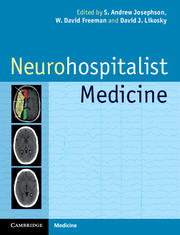Book contents
- Neurohospitalist Medicine
- Neurohospitalist Medicine
- Copyright page
- Contents
- Preface
- Acknowledgments
- Contributors
- Chapter 1 Cerebrovascular disease: ischemic
- Chapter 2 Cerebrovascular disease: hemorrhagic
- Chapter 3 Seizures and status epilepticus
- Chapter 4 Neuromuscular disorders
- Chapter 5 Coma, delirium and other disorders of consciousness
- Chapter 6 Neurological complications of electrolytes
- Chapter 7 Inpatient management of neuro-oncology patients
- Chapter 8 CNS infections
- Chapter 9 Spinal cord disease in the hospitalized patient
- Chapter 10 Neurological complications of systemic disorders
- Chapter 11 Management of traumatic brain injury
- Chapter 12 Perioperative neurological disorders
- Chapter 13 Neurological complications of pregnancy
- Chapter 14 Hypoxic-ischemic brain injury
- Chapter 15 The diagnosis of brain death
- Chapter 16 Ethical issues in hospitalist and inpatient neurology
- Chapter 17 Structural issues forneurohospitalists
- Index
Chapter 10 - Neurological complications of systemic disorders
Published online by Cambridge University Press: 07 October 2011
- Neurohospitalist Medicine
- Neurohospitalist Medicine
- Copyright page
- Contents
- Preface
- Acknowledgments
- Contributors
- Chapter 1 Cerebrovascular disease: ischemic
- Chapter 2 Cerebrovascular disease: hemorrhagic
- Chapter 3 Seizures and status epilepticus
- Chapter 4 Neuromuscular disorders
- Chapter 5 Coma, delirium and other disorders of consciousness
- Chapter 6 Neurological complications of electrolytes
- Chapter 7 Inpatient management of neuro-oncology patients
- Chapter 8 CNS infections
- Chapter 9 Spinal cord disease in the hospitalized patient
- Chapter 10 Neurological complications of systemic disorders
- Chapter 11 Management of traumatic brain injury
- Chapter 12 Perioperative neurological disorders
- Chapter 13 Neurological complications of pregnancy
- Chapter 14 Hypoxic-ischemic brain injury
- Chapter 15 The diagnosis of brain death
- Chapter 16 Ethical issues in hospitalist and inpatient neurology
- Chapter 17 Structural issues forneurohospitalists
- Index
Summary
Keywords
- Type
- Chapter
- Information
- Neurohospitalist Medicine , pp. 142 - 152Publisher: Cambridge University PressPrint publication year: 2011



